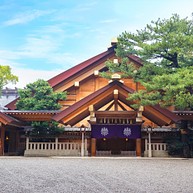
-
![Nagoya Castle in Japan]() Provided by: cowardlion/Shutterstock.com
Provided by: cowardlion/Shutterstock.com

Our travel guides are free to read and explore online. If you want to get your own copy, the full travel guide for this destination is available to you offline* to bring along anywhere or print for your trip.
*this will be downloaded as a PDF.Price
€4,95
Nagoya Castle
The guide was updated:Nagoya Castle is where the Tokugawa shogun made their home for over 250 years up until 1868, the year in which Japan’s partial isolation from the West came to an end with the beginning of the Meiji period. The castle was nearly destroyed in bombing raids of 1945 and authentically rebuilt only in 2018.
Useful Information
- Address: 1-1 Honmaru, Naka Ward, Nagoya
- More Info: Entrance to Nagoya Castle until 4pm
- Opening hours: Daily 9am–4:30pm
- Website: www.nagoyajo.city.nagoya.jp/en
- Phone: +81 52 231 1700
Digital Travel Guide Download
Our travel guides are free to read and explore online. If you want to get your own copy, the full travel guide for this destination is available to you offline* to bring along anywhere or print for your trip.
*this will be downloaded as a PDF.Price
€4,95

Nagoya Castle is where the Tokugawa shogun made their home for over 250 years up until 1868, the year in which Japan’s partial isolation from the West came to an end with the beginning of the Meiji period. The castle was nearly destroyed in bombing raids of 1945 and authentically rebuilt only in 2018.
Read more

Atsuta-jingu Shrine
The Atsuta Shrine is one of the most important sacred places in Japan, ranking second only to the Ise Shrine. It stores one of the so-called Imperial regalia, the sacred sword Kusanagi, and is well known for its peaceful and relaxing atmosphere.
Read more

Chubu Electric Power Mirai Tower
Nagoya TV Tower, the oldest broadcasting radio tower in Japan, stands proudly in the heart of the city since its construction in 1954. Renamed 'Chubu Electric Power Mirai Tower' on 1 May 2021, this iconic structure offers breathtaking views from its Sky Deck at 90 metres and Sky Balcony at 100 metres. Located in Hisaya-odori Park in Sakae, visitors can marvel at panoramic vistas of Nagoya and distant mountain ranges, including Mt. Ontake and Mt. Hakusan.
Read more

Toyota Commemorative Museum of Industry and Technology
The huge Toyota Museum is a must-visit for all those interested in automotive history. The automotive pavilion features a great range of vintage trucks and cars, while kids will love spending their time in the Technoland, a hands-on series of interactive displays. The Textile Machinery Pavilion offers a throwback to the time when the textile Industry was the main industry of Japan.
Read more

Higashiyama Zoo and Botanical Gardens
The Higashiyama Zoo and Botanical Gardens is a vast green expanse right in the heart of Nagoya City. The 20-hectare open-range zoo is one of Asia’s largest, featuring lions, tigers, giraffes, bears, and many other species. Gaze out onto the park from the Higashiyama Sky Tower and enjoy a good meal in the restaurant located on the 7th floor.
Read more

Tokugawa Park & The Tokugawa Art Museum
These lavish gardens were constructed in 1694 as a residential retreat for Mitsutomo, the second Lord of the Owari clan. Sadly, however, most of the garden and its buildings were destroyed during World War II. The restoration took a long time, with the garden being finally opened as a public park in 2004. If time permits, visit the adjacent Tokugawa Art Museum, the third oldest private museum in Japan, which miraculously survived the World War II air raids.
Read more

Kiso Valley
The enchanting Kiso Valley, nestled in the heart of Japan, is a timeless treasure, where history breathes through its ancient pathways and rustic architecture.
Four centuries ago, the picturesque villages of Magome and Tsumago served as crucial staging posts along the 500 km Nakasendo Highway, where feudal warlords journeyed annually to Edo (now Tokyo). Today, these villages retain their historic charm, with Magome seamlessly blending modern amenities with its traditional core, easily accessible by rail and bus from Nagoya. As you step onto the broad foot trail of 'old' Magome, the echoes of the past resonate, transporting you to an era untouched by time.
Read more

Yanagibashi Central Market
Yanagibashi Central Market is home to over 400 shops and fish stalls, dating back to the Edo era (1603–1868) and second in size only to Tokyo’s giant Tsukiji Fish Market. Giant tuna, octopus, shrimp and many other varieties of fish are on sale here from early morning (around 6 am is best).
Read more
Do & See
Hamanako Garden Park
About 30 minutes by rail from downtown Nagoya via Hamatsu City, Hamanako Garden Park is what remains of Pacific Flora, a floral exhibition that ran as a precursor to Expo 2005. Now the site, superbly located on a peninsula in Lake Hamana, has become a permanent civic attraction. Flowing through the grounds, just as during Pacific Flora, is the scenic Iridori Canal, still bridged by the classic Taikobashi ('tympani') Bridge. The park is now a popular staging ground for rally events, including the HPI Challenge All Asia Finals.
Read more
Nadya Park
Take a culture break in the Design Museum and Design Gallery. These cover everything from industrial and commercial to historical design, and have the visitor wondering (as happens every few minutes or so in Japan): 'Just where does this astonishing creativity come from?'
Read more

Port Of Nagoya Public Aquarium
The Port of Nagoya Public Aquarium, one of Japan's premier aquatic attractions, is a must-visit destination at Nagoya Port. This expansive and captivating aquarium is home to an array of marine life, including majestic Orca killer whales, playful dolphins, and enchanting Beluga whales, to name but a few.
Read more


